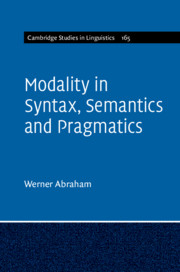
-
Select format
-
- Publisher:
- Cambridge University Press
- Publication date:
- 06 February 2021
- 17 September 2020
- ISBN:
- 9781139108676
- 9781107021228
- 9781107605503
- Dimensions:
- (228 x 152 mm)
- Weight & Pages:
- 0.81kg, 456 Pages
- Dimensions:
- (229 x 152 mm)
- Weight & Pages:
- 0.68kg, 456 Pages
You may already have access via personal or institutional login
Book description
What do we mean when we say things like 'If only we knew what he was up to!' Clearly this is more than just a message, or a question to our addressee. We are expressing simultaneously that we don't know, and also that we wish to know. Several modes of encoding contribute to such modalities of expression: word order, subordinating subjunctions, sentences that are subordinated but nevertheless occur autonomously, and attitudinal discourse adverbs which, far beyond lexical adverbials of modality, allow the speaker and the listener to presuppose full agreement, partial agreement under presupposed conditions, or negotiation of common ground. This state of the art survey proposes a new model of modality, drawing on data from a variety of Germanic and Slavic languages to find out what is cross-linguistically universal about modality, and to argue that it is a constitutive part of human cognition.
Reviews
‘… a coherent read.’
Maria Amparo Soler Source: LINGUIST List
Contents
Metrics
Altmetric attention score
Full text views
Full text views help Loading metrics...
Loading metrics...
* Views captured on Cambridge Core between #date#. This data will be updated every 24 hours.
Usage data cannot currently be displayed.
Accessibility standard: Unknown
Why this information is here
This section outlines the accessibility features of this content - including support for screen readers, full keyboard navigation and high-contrast display options. This may not be relevant for you.
Accessibility Information
Accessibility compliance for the PDF of this book is currently unknown and may be updated in the future.


